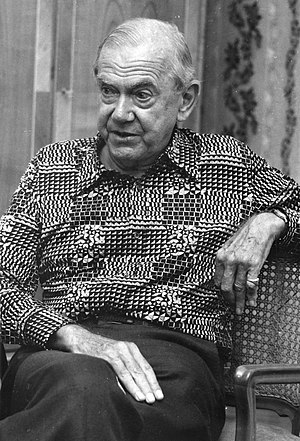
You are all alike, you people. You never learn the truth--that God knows nothing.
Share this quote:
She was not too young to be wise, but she was too young to know that wisdom shouldnt be spoken aloud when you are happy.
Share this quote:
The sense of unhappiness is so much easier to convey than that of happiness. In misery we seem aware of our own existence, even though it may be in the form of a monstrous egotism: this pain of mine is individual, this nerve that winces belongs to me and to no other. But happiness annihilates us: we lose our identity.
Share this quote:
Point me out the happy man and I will point you out either extreme egotism, selfishness, evil -- or else an absolute ignorance.
Share this quote:
She couldnt avoid being serious about things she cared for, and happiness made her grave at the thought of all the things which might destroy it.
Share this quote:
Hope was an instinct only the reasoning human mind could kill. An animal never knew despair.
Share this quote:
If you have abandoned one faith, do not abandon all faith. There is always an alternative to the faith we lose. Or is it the same faith under another name?
Share this quote:
disappointment had to be postponed, hope kept alive as long as possible;
Share this quote:
She had lost all our memories for ever, and it was as though by dying she had robbed me of part of myself. I was losing my individuality. It was the first stage of my own death, the memories dropping off like gangrened limbs.
Share this quote:
He gave her a bright fake smile; so much of life was a putting off of unhappiness for another time. Nothing was ever lost by delay. He had a dim idea that perhaps if one delayed long enough, things were taken out of ones hands altogether by death.
Share this quote:
We are all resigned to death: its life we arent resigned to.
Share this quote:
Life would go out in a fraction of a second (that was the phrase), but all night he had been realizing that time depends on clocks and the passage of light. There were no clocks and the light wouldnt change. Nobody really knew how long a second of pain could be. It might last a whole purgatory--or for ever.
Share this quote:
I recognized my work for what it was--as unimportant a drug as cigarettes to get one through the weeks and years. If we are extinguished by death, as I still try to believe, what point is there in leaving some books behind any more than bottles, clothes, or cheap jewellry?
Share this quote:
Nothing in life was as ugly as death.
Share this quote:
One forgets the dead quite quickly; one doesnt wonder about the dead-what is he doing now, who is he with?
Share this quote:
He had in those days imagined himself capable of extraordinary heroisms and endurances which would make the girl he loved forget the awkward hands and the spotty chin of adolescence. Everything had seemed possible. One could laugh at daydreams, but so long as you had the capacity to daydream there was a chance that you might develop some of the qualities of which you dreamed. It was like the religious discipline: words however emptily repeated can in time form a habit, a kind of unnoticed sediment at the bottom of the mind, until one day to your own surprise you find yourself acting on the belief you thought you didnt believe in.
Share this quote:
The woman had gone down on her knees and was shuffling slowly across the cruel ground towards the group of crosses: the dead baby rocked on her back. When she reached the tallest cross she unhooked the child and held the face against the wood and afterwards the loins: then she crossed herself, not as ordinary Catholics do, but in a curious and complicated pattern which included the nose and ears. Did she expect a miracle? And if she did, why should it not be granted her? the priest wondered. Faith, one was told, could move mountains, and here was faith--faith in the spittle that healed the blind man and the voice that raised the dead. The evening star was out: it hung low down over the edge of the plateau: it looked as if it was within reach: and a small hot wind stirred. The priest found himself watching the child for some movement. When none came, it was as if God had missed an opportunity. The woman sat down, and taking a lump of sugar from her bundle, began to eat, and the child lay quiet at the foot of the cross. Why, after all, should we expect God to punish the innocent with more life?
Share this quote:
A story has no beginning or end: arbitrarily one chooses that moment of experience from which to look back or from which to look ahead.
Share this quote:
So much in writing depends on the superficiality of ones days. One may be preoccupied with shopping and income tax returns and chance conversations, but the stream of the unconscious continues to flow undisturbed, solving problems, planning ahead: one sits down sterile and dispirited at the desk, and suddenly the words come as though from the air: the situations that seemed blocked in a hopeless impasse move forward: the work has been done while one slept or shopped or talked with friends.
Share this quote:
It is the storytellers task to elicit sympathy and a measure of understanding for those who lie outside the boundaries of State approval.
Share this quote: